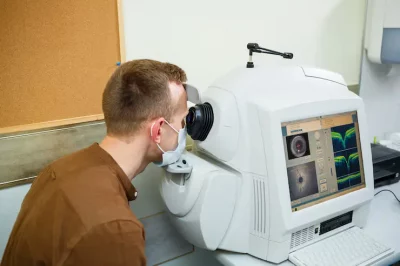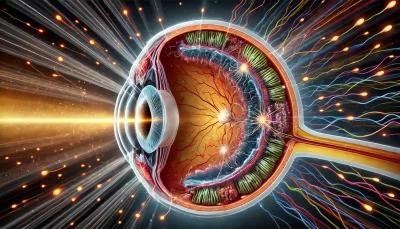Our eyes are truly precious and allow us to experience the wonders of the world every day. They help us enjoy the beauty of nature, cherish art, and recognise the faces of those we love. However, our eyes are also susceptible to various health issues that can impact our vision.
One such condition that demands attention is central retinal vein occlusion (CRVO). In this blog, we will explore what CRVO is, its types, symptoms, risk factors, causes, and, most importantly, the professional approach to central retinal vein occlusion treatment.
Understanding CRVO: A Two-Pronged Attack
Central retinal occlusion is a condition affecting the retina, the essential light-sensitive tissue at the back of the eye. It takes place when a blood clot obstructs the main vein that supplies the retina with blood.
It is noteworthy that CRVO predominantly affects one eye. While some individuals may not exhibit any symptoms, many experience blurry vision. The good news is that early intervention can significantly reduce the risk of vision loss.
Types of CRVO
CRVO occurs when a blood clot obstructs the central retinal vein, impeding blood flow and oxygen delivery to the retina. This can lead to blurry vision, macular oedema (fluid buildup in the retina), and even permanent vision loss if left untreated. This disease manifests itself in two ways:
-
Non-Ischemic:
This milder form exhibits minimal blood flow disruption and leakage from retinal vessels, often causing blurry vision without significant retinal damage.
-
Ischemic:
This severe form involves blockage of blood flow, leading to retinal oxygen deprivation and potential damage. Diminished vision, pain, and redness are common symptoms.
Recognising the Signs
Central Retinal Vein Occlusion can present with various symptoms, and the severity may vary among individuals. It’s important to note that some people may not experience any symptoms, especially in the early stages. When symptoms do appear, though, they may include:
-
Blurry Vision:
A common symptom, with severity varying based on the type of central retinal vein occlusion.
-
Pain or Redness:
This may occur in more severe cases.
-
Asymptomatic:
Some individuals may not experience symptoms of mild central retinal occlusion.
Diagnosis of CRVO
Comprehensive dilated eye exams are instrumental in diagnosing central retinal vein occlusion. Eye doctors utilise eye drops to dilate the pupils and then examine the eyes for CRVO and other related issues. Additional tests, such as fluorescein angiogram and optical coherence tomography (OCT), may be conducted to provide a more detailed understanding of the condition.
Central Retinal Vein Occlusion Treatment
While there is no cure for central retinal occlusion, various treatments aim to improve vision and prevent symptom progression. Reducing the likelihood of visual impairment requires early identification and timely intervention. Two primary treatment modalities are:
-
Injections:
Anti-VEGF medicines can effectively reduce VEGF levels, helping to alleviate and prevent macular oedema. In some cases, a single injection suffices, but multiple injections may be required. Steroid medicines can also be employed to address swelling.
-
Laser Treatment:
In severe cases, a laser treatment known as pan-retinal photocoagulation (PRP) may be recommended. PRP involves creating tiny burns in the retina, reducing the likelihood of bleeding and elevated eye pressure.
Central Retinal Vein Occlusion is a serious eye condition, and understanding its types, symptoms, risk factors, and causes is crucial for early detection. With advancements in treatment modalities, individuals diagnosed with CRVO can benefit from professional approaches that aim to improve vision and prevent further complications.
Regular eye check-ups, especially for individuals at higher risk, play a vital role in maintaining eye health and preventing the progression of central retinal occlusion.
While central retinal vein occlusion demands immediate attention, Dr Agarwals Eye Hospital stands as a beacon of hope and expertise. Our comprehensive eye check-ups help identify the symptoms at their earliest stages, increasing the chances of successful central retinal vein occlusion treatment.
Don’t let CRVO dim your future. Choose Dr Agarwals Eye Hospital for comprehensive care, advanced treatment options, and a brighter vision!








